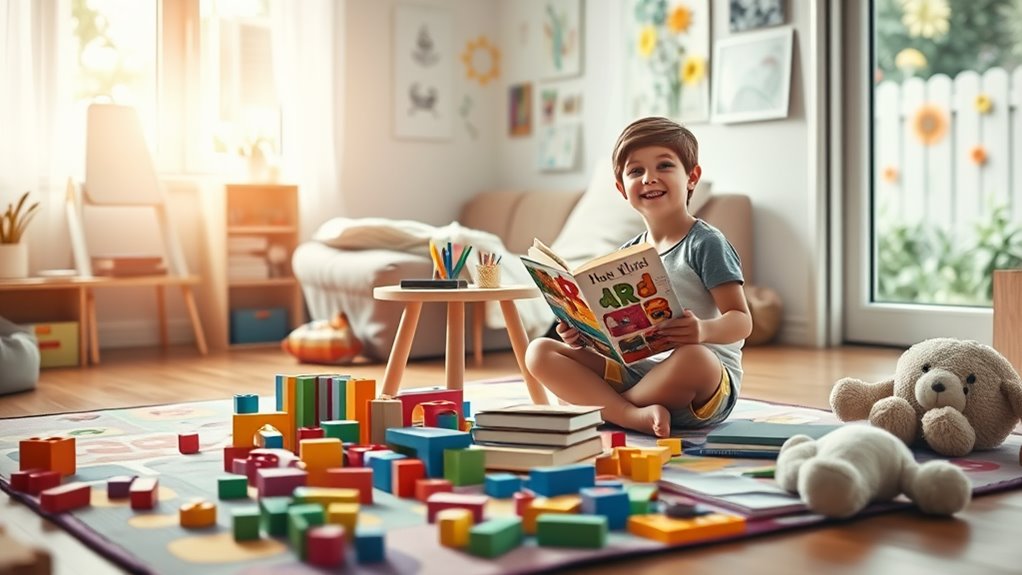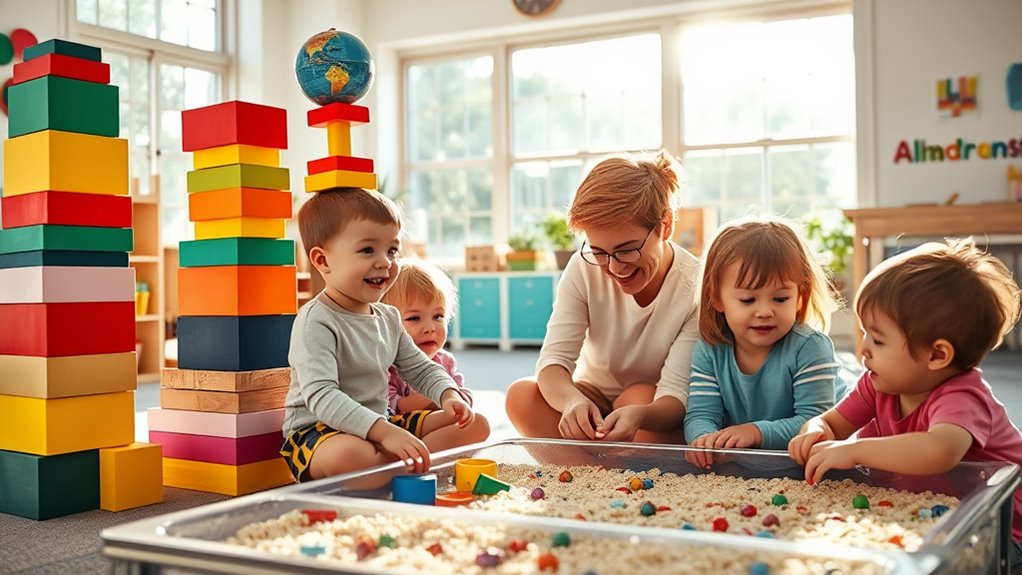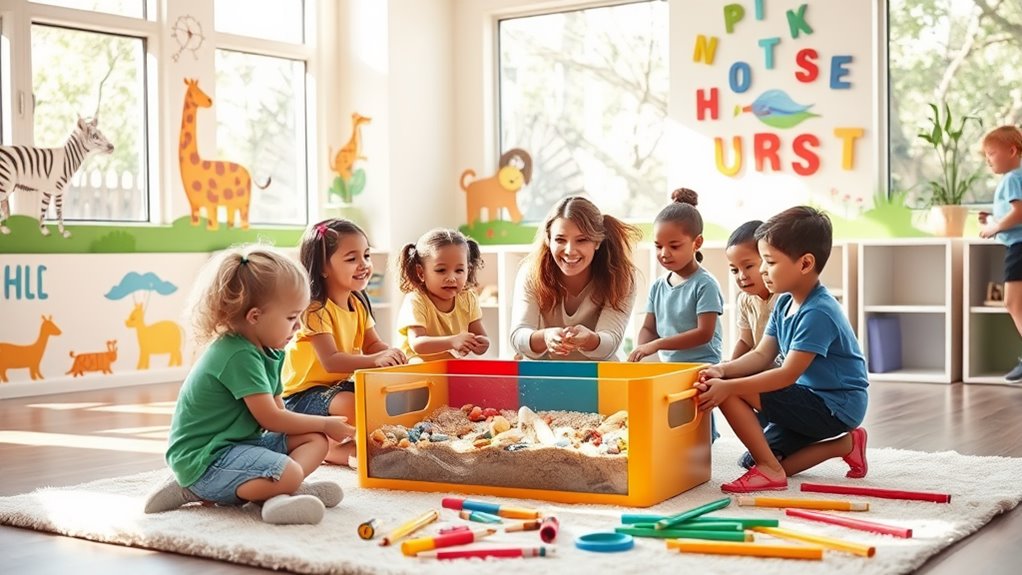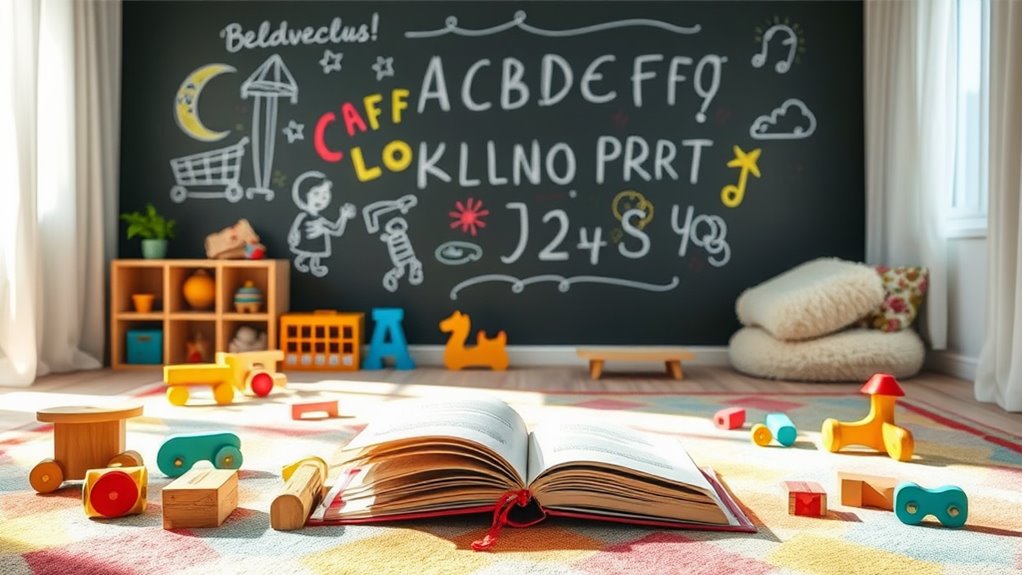How to Support Early Childhood Education at Home!
You can significantly support your child’s early education by creating a nurturing learning environment at home. Designate a space filled with age-appropriate materials that spark curiosity and exploration. Incorporate play-based learning, like sensory bins or outdoor activities, to make learning fun. Encourage creativity through art, music, and storytelling, allowing your child to express themselves freely. Don’t forget to foster social skills by promoting cooperative play with peers and modeling positive interactions. Establish consistent routines for stability and focus. There’s so much more to explore, so let’s dive deeper into these enriching approaches.
Key Takeaways
- Create a dedicated learning space at home with age-appropriate materials to encourage exploration and curiosity.
- Incorporate play-based learning through sensory activities and everyday tasks to enhance skills and engagement.
- Foster creativity by providing diverse art materials and encouraging imaginative play and storytelling.
- Promote social skills through cooperative play, communication modeling, and organized group activities.
- Use positive reinforcement to celebrate emotional milestones and create a safe space for emotional expression.
Create a Learning Environment
Creating a nurturing learning environment at home is essential for your child’s early development. You’ll want to thoughtfully design learning spaces that inspire curiosity and creativity. Start by dedicating a specific area in your home where your child can engage in various activities. This space should be well-organized, filled with age-appropriate materials that encourage exploration and learning.
Incorporate sensory areas that stimulate your child’s senses. Consider adding textures, colors, and scents that invite touch, sight, and smell. For instance, a bin filled with sand or water can spark imaginative play while enhancing fine motor skills. You might also include art supplies, building blocks, and books to encourage cognitive growth.
Incorporate Play-Based Learning
Play-based learning is a powerful way to support your child’s development while keeping the experience enjoyable and engaging. By incorporating play into everyday activities, you foster creativity, problem-solving skills, and social interaction. Use sensory activities to captivate your child’s curiosity—think about creating a simple sensory bin filled with rice, beans, or water beads. This hands-on experience not only stimulates their senses but also enhances fine motor skills as they scoop, pour, and explore.
Don’t forget the importance of outdoor exploration. Nature offers a wealth of opportunities for learning through play. Encourage your child to observe insects, collect leaves, or build forts from sticks. These activities not only promote physical health but also spark imagination and curiosity about the world around them.
You can also integrate educational concepts seamlessly into play. For example, during a pretend grocery store game, use it as a chance to practice counting, sorting, and even learning about healthy food choices. By weaving together play, sensory activities, and outdoor exploration, you create a rich tapestry of learning experiences that support your child’s growth in a fun and meaningful way.
Read Together Daily
Reading together daily is a wonderful way to spark your child’s imagination and curiosity. Choose engaging books that resonate with their interests, and don’t hesitate to discuss the characters, settings, and plots to deepen their understanding. This interactive experience not only cultivates a love for reading but also encourages imaginative play that brings stories to life!
Choose Engaging Books
When you pick out engaging books to read together daily, you’re not just sharing stories; you’re fostering a love for reading that can last a lifetime. Selecting books with captivating book themes—like friendship, adventure, or imagination—draws your child into the narrative, making reading an exciting experience. Look for stories that resonate with their interests and spark curiosity.
Character development plays a crucial role in this process. Choose books where characters face challenges and grow, helping your child understand emotions and moral lessons. Discussing the characters’ feelings and decisions can ignite meaningful conversations, enhancing comprehension and empathy.
Vary the genres to keep things fresh; explore picture books, fairy tales, and non-fiction. This diversity not only broadens their knowledge but also allows them to see the world from different perspectives.
Discuss Story Elements
As you dive into stories together each day, take the opportunity to discuss the various elements that make up a narrative. By engaging your child in conversations about character development and plot structure, you’ll deepen their understanding of storytelling and enhance their critical thinking skills.
Start by exploring the characters. Ask your child who their favorite character is and why. Discuss how the character changes throughout the story. This helps them grasp the importance of character development and encourages empathy as they consider different perspectives.
Next, move on to plot structure. Discuss the beginning, middle, and end of the story. Encourage your child to identify the main conflict and how it’s resolved. Ask questions like, “What would happen if the character made a different choice?” This not only reinforces their grasp of narrative flow but also nurtures creativity and problem-solving skills.
Encourage Imaginative Play
Daily reading sessions can spark your child’s imagination and creativity like nothing else. When you dive into books together, you open the door to new worlds filled with vibrant characters and thrilling adventures. This becomes the perfect backdrop for imaginative storytelling, allowing your child to envision scenarios beyond the pages.
After reading, encourage your little one to engage in role playing games based on the stories you’ve explored. Ask them open-ended questions about the characters: “What do you think the hero would do next?” or “How would the princess feel in that situation?” This not only deepens their understanding but also fosters critical thinking and empathy.
Provide props or costumes to make the experience more immersive. Transform your living room into a pirate ship or a fairy tale castle. These playful environments encourage your child to express themselves freely, building confidence in their creative abilities.
Encourage Creativity and Expression
Creativity and self-expression are vital components of early childhood development, and fostering these skills at home can lead to a lifetime of imaginative thinking. You can create a vibrant environment that encourages your child to explore various artistic activities, helping them to communicate their thoughts and feelings in unique ways.
Start by providing diverse materials—paints, crayons, clay, and recycled objects—and let your child experiment freely. Encourage them to create whatever inspires them, without worrying about the final product. This approach not only nurtures creativity but also builds confidence in their abilities.
Introduce expressive outlets like music and dance, too. Play different genres of music and let your child move to the rhythm, or provide instruments for them to explore sounds. Storytelling, whether through books or their own narratives, is another fantastic way to spark creative expression.
Foster Social Skills
Fostering social skills in your child is essential for their development and happiness. You can encourage cooperative play, model positive interactions, and promote open communication to help them build strong relationships. By creating a supportive environment, you’ll set the stage for your little one to thrive socially.
Encourage Cooperative Play
Cooperative play is a vital ingredient in developing social skills during early childhood. By encouraging your child to engage in teamwork activities, you’re helping them learn how to communicate effectively, share resources, and work towards shared goals. These experiences lay the groundwork for strong interpersonal skills that will benefit them throughout their lives.
Start by creating opportunities for cooperative play at home. Set up simple games that require collaboration, like building a fort or completing a puzzle together. These activities not only foster teamwork but also teach your child how to navigate conflicts and celebrate successes with peers.
Incorporate group playdates where kids can engage in cooperative games, such as relay races or team sports. This helps them understand the importance of working together and relying on one another.
Encourage your child to express their thoughts and feelings during these interactions. Ask them questions about their experiences, helping them reflect on what went well and what they’d like to improve. By promoting cooperative play, you’re nurturing their ability to build relationships, resolve conflicts, and thrive in group settings.
Model Positive Interactions
One of the most effective ways to help your child develop strong social skills is by modeling positive interactions in your daily life. When you engage with others, whether family, friends, or strangers, demonstrate respectful communication. Use polite language, maintain eye contact, and listen actively. Your child absorbs these behaviors and learns how to engage meaningfully with others.
Incorporate positive reinforcement when your child exhibits good social behaviors. Praise them when they share toys, express feelings, or resolve conflicts peacefully. This reinforcement encourages them to repeat those actions and fosters a sense of confidence in their social abilities.
Additionally, narrate your interactions. For example, when you thank a cashier or ask a neighbor how their day was, explain why those interactions matter. This practice not only highlights respectful communication but also shows your child the importance of connecting with others.
Promote Open Communication
Open communication plays a vital role in helping your child develop essential social skills. By fostering an environment where your child feels comfortable sharing thoughts and feelings, you’ll encourage their emotional expression. Start by making it a habit to engage in conversations daily. Ask open-ended questions that invite deeper discussions, allowing your child to articulate their ideas and emotions.
Practicing active listening is crucial. Show genuine interest in what your child says by maintaining eye contact, nodding, and responding appropriately. This not only validates their feelings but also models how to engage in meaningful dialogue. When they share their experiences, reflect back what you hear, reinforcing their understanding and encouraging further exploration of their emotions.
Create safe spaces for emotional expression. Let your child know it’s okay to feel sad, happy, or frustrated. Validate their feelings and help them find words to describe these emotions. This teaches them the art of emotional communication, which is key to forming healthy relationships.
Use Everyday Learning Opportunities
Everyday moments can become powerful learning experiences for your child. You don’t need a structured lesson plan to foster their growth; instead, embrace the opportunities that arise in daily life. For instance, take a walk in the park and encourage nature exploration. Ask your child to observe different plants, insects, and weather patterns. This simple activity can spark curiosity and lead to discussions about biology, ecology, and the environment.
Incorporating household chores into your routine is another excellent way to promote learning. When you involve your child in tasks like cooking or cleaning, you’re teaching them essential skills. Ask them to measure ingredients, which introduces concepts of math and science. While folding laundry, engage them in sorting by color or size, enhancing their categorization skills.
Establish a Routine
Establishing a routine can greatly enhance your child’s learning and development, providing them with a sense of security and stability. By creating consistent morning rituals and bedtime routines, you set the stage for a structured day that promotes focus and self-discipline.
Start your day by establishing a series of engaging morning rituals. This could include a healthy breakfast, followed by a few minutes of reading together or discussing the day’s plans. These moments not only foster a love for learning but also help your child feel prepared and confident.
As the day winds down, transition into calming bedtime routines. Create a peaceful environment by dimming the lights, reading a story, or practicing a few minutes of mindfulness together. This not only signals that it’s time to rest but also reinforces the importance of winding down after an active day.
Frequently Asked Questions
How Can I Choose Educational Toys for My Child?
Choosing educational toys for your child’s growth is like planting seeds in a garden. Look for options that nurture developmental skills, ensuring toy safety. You’ll cultivate creativity and learning while keeping your little one safe and engaged.
What Are the Signs of Readiness for Formal Schooling?
When assessing school age readiness, observe your child’s developmental milestones. Look for social skills, communication abilities, and emotional regulation. If they express curiosity and can follow instructions, they’re likely ready for formal schooling!
How Do I Measure My Child’s Learning Progress at Home?
Did you know that 80% of brain development happens by age three? To measure your child’s learning progress at home, track learning milestones and use assessment techniques like observations and playful assessments to gauge their growth.
What Should I Do if My Child Resists Learning Activities?
If your child resists learning activities, try incorporating playful learning and use positive reinforcement. Make it fun with games, celebrate small victories, and encourage curiosity. This approach helps them embrace learning rather than shy away from it.
How Can I Involve Grandparents in My Child’s Education?
Imagine a garden flourishing with diverse flowers. Involve grandparents in your child’s education by encouraging them to share stories or lead educational activities. Their involvement nurtures growth, creating a vibrant learning environment filled with love.




